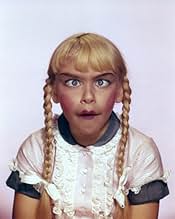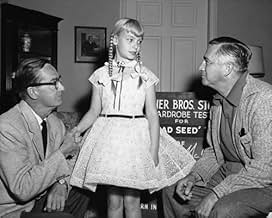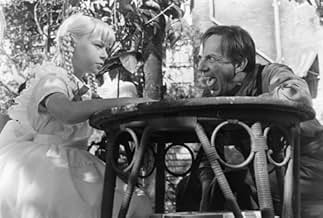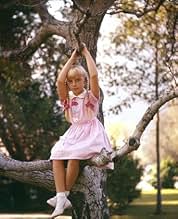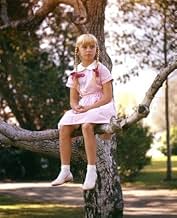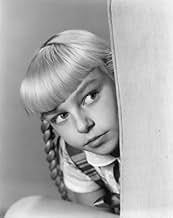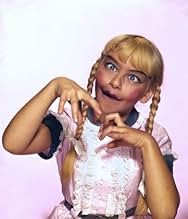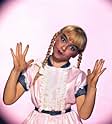- Nominated for 4 Oscars
- 1 win & 6 nominations total
Joan Croydon
- Miss Fern
- (as Joan Croyden)
Frances Bavier
- Woman in Dinner Party
- (uncredited)
Violet N. Cane
- Teacher
- (uncredited)
Vivian Clermont
- Mary Beth Musgrove
- (uncredited)
Shelley Fabares
- Margie
- (uncredited)
Kathy Garver
- Rhoda's Classmate
- (uncredited)
Don C. Harvey
- Guard in Hospital Corridor
- (uncredited)
Edna Holland
- Saleslady
- (uncredited)
- Director
- Writers
- All cast & crew
- Production, box office & more at IMDbPro
Featured reviews
I watched this film again last night and can't count how many times I've seen it.
What I find fascinating is the that two leads, Nancy Kelly and Patty McCormick don't seem to fit with the talent of the rest of the cast, most of whom are very good character actors.
McCormick plays the role of Rhoda as if she's in the stage play, but on film it comes off as over-acting.
Nancy Kelly is too whiny and seems to swing back and forth between being terrified and oblivious, with no middle range. One minute she thinks her daughter is a murderer and then next she's leaving her alone to go grocery shopping if there's nothing wrong. If she's trying to convey denial due to the love she has for her daughter, it doesn't work.
There are a couple of scenes that don't seem to accomplish anything as they end with someone having to go to dinner or lunch so everyone can just ignore the fact that they believe this child to be terribly disturbed and possibly worse. In this instance maybe we should consider the times in which the film was made.
Something just doesn't flow right for me, yet, I watch this movie almost every time I catch it on television. I can't explain why, but maybe that was the intention of the film maker.
What I find fascinating is the that two leads, Nancy Kelly and Patty McCormick don't seem to fit with the talent of the rest of the cast, most of whom are very good character actors.
McCormick plays the role of Rhoda as if she's in the stage play, but on film it comes off as over-acting.
Nancy Kelly is too whiny and seems to swing back and forth between being terrified and oblivious, with no middle range. One minute she thinks her daughter is a murderer and then next she's leaving her alone to go grocery shopping if there's nothing wrong. If she's trying to convey denial due to the love she has for her daughter, it doesn't work.
There are a couple of scenes that don't seem to accomplish anything as they end with someone having to go to dinner or lunch so everyone can just ignore the fact that they believe this child to be terribly disturbed and possibly worse. In this instance maybe we should consider the times in which the film was made.
Something just doesn't flow right for me, yet, I watch this movie almost every time I catch it on television. I can't explain why, but maybe that was the intention of the film maker.
I really loved this film. You can't beat a movie like this, with the dripping campy delivery by Rhoda. Great stuff. I watched this shortly after the AFI Heroes & Villains list came out, and was surprised to see that not only was Rhoda not in the top 50 Villains list, but she wasn't even on the nominating form. Too bad because this a film where you really end up hating the antagonist and are hoping that someone really clobbers her! That's what makes a great villain. (Incidentally, my wife and I watched this shortly after we found out she's pregnant. Wish us luck!)
"Now there's a little ray of sunshine, that one."
An occasionally riveting movie from the 50's about a sunny, charming, sociopathic little girl and her mother's desperate attempts to protect her and hide her nature. The Bad Seed sometimes makes the mistake of focusing too much on the dull adults, but overall, it's a solid movie. Good acting all around, and unlike similar modern movies like Orphan, The Bad Seed gets better as it goes along instead of imploding into an absurd mess. It feels a lot like a play, which is natural due to its evolution from novel to stage-play to film.
I thought The Bad Seed was a sinister (and relatively timeless) gem of the 50's, and I'm sure it was quite controversial in its time. The ending was changed because of the Hays Code, in fact, and feels a bit like a cop-out as a result, but not to the extent of ruining what came before. Check it out if you're interested.
An occasionally riveting movie from the 50's about a sunny, charming, sociopathic little girl and her mother's desperate attempts to protect her and hide her nature. The Bad Seed sometimes makes the mistake of focusing too much on the dull adults, but overall, it's a solid movie. Good acting all around, and unlike similar modern movies like Orphan, The Bad Seed gets better as it goes along instead of imploding into an absurd mess. It feels a lot like a play, which is natural due to its evolution from novel to stage-play to film.
I thought The Bad Seed was a sinister (and relatively timeless) gem of the 50's, and I'm sure it was quite controversial in its time. The ending was changed because of the Hays Code, in fact, and feels a bit like a cop-out as a result, but not to the extent of ruining what came before. Check it out if you're interested.
I saw "The Bad Seed" years ago, circa 1970, for the first time, and have seen it periodically over the years. When I first saw the film, as a child, I found the film, expectedly, quite chilling.
I saw it again this afternoon, after not having seen it for about three years, and still find it quite disturbing. Now that we have IMDb, I decided to offer my thoughts. And so, I was shocked to find SO MANY comments about it...more than for any other film that I've reviewed on IMDb to date. If I add anything of unique value, great. If not, I'm happy to share my review anyway.
Certainly, there are flaws, or perhaps only "unique differences", in this film. Primarily, it can very easily be considered a filmed play, as the staging, the dialog, and the entrances and exits of the characters throughout the film seem to be lifted directly from the stage version. Therefore, some may find the film a bit too sterile or unnatural in many ways. However, I think it is this very sterile, staged, stark-from-a-production-standpoint quality that gives the film an even eerier and in some ways far more realistic edge than might be found were it to be produced today for film, with far more slick and sophisticated sets, dialog, camera work, etc. The realism and pronounced disturbing quality of this version stems from the simple story itself, the psychological horror of which could be in some ways obfuscated from a much more sophisticated, big-studio, modern-day production.
As for the subject matter itself, I know that the number of cases, historically, involving child murderers is actually low. Therefore, some critics have argued that to take a relatively rare phenomenon, such as the child murderer, and build a motion picture around it, portraying it in the vein of plausibility, can be misleading and dangerous, giving the impression, especially to younger viewers, that child criminals are more commonplace than you may think. I wholeheartedly reject this notion. The whole purpose of acting is to portray the entire range of the human condition with as much truth as possible, no matter how rare or commonplace certain aspects of human behavior might be. Though child murderers may be few in number, it's an area worthy of as much exploration, in film, as is an ugly, unrealistic alien telling us to "phone home" or the sinking of the Titanic.
Even though this film possesses a definite "campy", staged, and perhaps even "cult" quality, it is chillingly effective. One reason for which this film works is due to the character of Rhoda herself, played by Patty McCormack. The smiling, blond, blue-eyed veneer of the child juxtaposed with the idea of her criminal potential (and actions) is just plain "creepy". Moreover, the less you see, in terms of the actual crimes she commits, the more you conjure. And, you continually wonder who her next victim will be. Furthermore, you wonder how many people will eventually "come on to her" and become aware of whom she is, and how that knowledge will affect their fate.
Another reason for which this film works is because of the mother, Christine, played by Nancy Kelly. As we slowly watch her become aware of what has become of her daughter, we can't help but empathize with her predicament and her decision in handling it. The first few times I saw the film, just as I felt that Patty McCormack's portrayal and dialog delivery were probably mere replicas of what she offered on stage, I felt that Nancy Kelly's performance was affected and probably lifted directly from her work on the stage (I've never seen a stage version, nor have I read the book, yet). But in the case of Ms. Kelly, watching her realize what she has ultimately given birth to and raised is very heart wrenching. Moreover, I have always wondered if the use of her right hand was a direction given to her by either of her directors (for play or film), or if it was something she came up with herself. Two instances come to mind.
In the first one, the manner in which she hits the table with her right hand as she listens to what is happening outside near her shed while Rhoda plays "Au Claire de la Lune" on her piano is very pronounced, appears somewhat odd and is perhaps symbolic. She seemed to be pounding her hand not only in outward denial and anger at the realization she now has of what her child is capable of committing, but as a means to torture and punish herself for having given birth to her in the first place. In the second instance, Nancy Kelly used her right hand again in a very pronounced manner when she offers Rhoda her vitamins "that night". Again, I couldn't help but wonder what symbolism she wanted us to draw from her gesture. It might be said that this very hand, which once comforted and fed her child all her life, has now become the tool that feeds the ultimate fate of her child toward the end of the film. (Again, not having read it, I have a fairly good idea how the book ends).
As for how the ending/epilogue in the film was handled, practically everyone on this site who has offered a review knows that the use of the "casting call" was basically dictated by the mandates of the Hays Code. I'll just add that I find that the chilling effect of the story carries over to this bizarre "epilogue". I still find it a bit unsettling to see each of these actors take their bows, especially considering that some of the characters they portrayed would, in my estimation, appear stranger to a child than does Rhoda....particularly Leroy, when he bows to the viewing audience carrying his large pitchfork.
I saw it again this afternoon, after not having seen it for about three years, and still find it quite disturbing. Now that we have IMDb, I decided to offer my thoughts. And so, I was shocked to find SO MANY comments about it...more than for any other film that I've reviewed on IMDb to date. If I add anything of unique value, great. If not, I'm happy to share my review anyway.
Certainly, there are flaws, or perhaps only "unique differences", in this film. Primarily, it can very easily be considered a filmed play, as the staging, the dialog, and the entrances and exits of the characters throughout the film seem to be lifted directly from the stage version. Therefore, some may find the film a bit too sterile or unnatural in many ways. However, I think it is this very sterile, staged, stark-from-a-production-standpoint quality that gives the film an even eerier and in some ways far more realistic edge than might be found were it to be produced today for film, with far more slick and sophisticated sets, dialog, camera work, etc. The realism and pronounced disturbing quality of this version stems from the simple story itself, the psychological horror of which could be in some ways obfuscated from a much more sophisticated, big-studio, modern-day production.
As for the subject matter itself, I know that the number of cases, historically, involving child murderers is actually low. Therefore, some critics have argued that to take a relatively rare phenomenon, such as the child murderer, and build a motion picture around it, portraying it in the vein of plausibility, can be misleading and dangerous, giving the impression, especially to younger viewers, that child criminals are more commonplace than you may think. I wholeheartedly reject this notion. The whole purpose of acting is to portray the entire range of the human condition with as much truth as possible, no matter how rare or commonplace certain aspects of human behavior might be. Though child murderers may be few in number, it's an area worthy of as much exploration, in film, as is an ugly, unrealistic alien telling us to "phone home" or the sinking of the Titanic.
Even though this film possesses a definite "campy", staged, and perhaps even "cult" quality, it is chillingly effective. One reason for which this film works is due to the character of Rhoda herself, played by Patty McCormack. The smiling, blond, blue-eyed veneer of the child juxtaposed with the idea of her criminal potential (and actions) is just plain "creepy". Moreover, the less you see, in terms of the actual crimes she commits, the more you conjure. And, you continually wonder who her next victim will be. Furthermore, you wonder how many people will eventually "come on to her" and become aware of whom she is, and how that knowledge will affect their fate.
Another reason for which this film works is because of the mother, Christine, played by Nancy Kelly. As we slowly watch her become aware of what has become of her daughter, we can't help but empathize with her predicament and her decision in handling it. The first few times I saw the film, just as I felt that Patty McCormack's portrayal and dialog delivery were probably mere replicas of what she offered on stage, I felt that Nancy Kelly's performance was affected and probably lifted directly from her work on the stage (I've never seen a stage version, nor have I read the book, yet). But in the case of Ms. Kelly, watching her realize what she has ultimately given birth to and raised is very heart wrenching. Moreover, I have always wondered if the use of her right hand was a direction given to her by either of her directors (for play or film), or if it was something she came up with herself. Two instances come to mind.
In the first one, the manner in which she hits the table with her right hand as she listens to what is happening outside near her shed while Rhoda plays "Au Claire de la Lune" on her piano is very pronounced, appears somewhat odd and is perhaps symbolic. She seemed to be pounding her hand not only in outward denial and anger at the realization she now has of what her child is capable of committing, but as a means to torture and punish herself for having given birth to her in the first place. In the second instance, Nancy Kelly used her right hand again in a very pronounced manner when she offers Rhoda her vitamins "that night". Again, I couldn't help but wonder what symbolism she wanted us to draw from her gesture. It might be said that this very hand, which once comforted and fed her child all her life, has now become the tool that feeds the ultimate fate of her child toward the end of the film. (Again, not having read it, I have a fairly good idea how the book ends).
As for how the ending/epilogue in the film was handled, practically everyone on this site who has offered a review knows that the use of the "casting call" was basically dictated by the mandates of the Hays Code. I'll just add that I find that the chilling effect of the story carries over to this bizarre "epilogue". I still find it a bit unsettling to see each of these actors take their bows, especially considering that some of the characters they portrayed would, in my estimation, appear stranger to a child than does Rhoda....particularly Leroy, when he bows to the viewing audience carrying his large pitchfork.
I love this movie. I have read many reviews from professionals and they all seem to think the movie is too theatrical and you can tell it was a stage play and that the mother is especially dramatic. She is, that's true, but in the same way Faye Dunaway chews up Mommie Dearest and we all know what a hoot that is. Little Rhoda is a real stinker. The handyman had better "give her those shoes." The subplot of the mother's own identity is fun too. All in all, the movie is very 50s. You can almost see Wally and the Beaver coming down the street. Great! There is also some discussion about the formal introduction of the cast at the end which I've always found a very nice touch. Much older films of the 30s used to do that all the time. It's been said this film did it to show the characters were just flesh and blood actors and so their roles and the subject matter (especially Patty McCormack) shouldn't be taken seriously. See it. By the way, there is one review on this site by someone who says they saw the movie at age 12 that is very negative. Don't believe it!
Did you know
- TriviaThe original Broadway production of "The Bad Seed" by Maxwell Anderson opened on December 8, 1954 and ran for 334 performances. Nancy Kelly won the 1955 Tony Award for Actress in a Drama and recreated her part in the movie. Patty McCormack, Eileen Heckart, Evelyn Varden, Henry Jones and Joan Croydon also recreated their stage roles in the movie version.
- GoofsWhen Christine scolds Rhoda for asking for a garnet as well as a turquoise, the reflection of someone, probably Mervyn LeRoy, sitting in a chair with his legs crossed is visible in the coffee pot. Addition: Just to the left of the reflection that is assumed to be LeRoy you can see other crew members moving in the shadow of the door frame reflected in the coffee pot.
- Crazy creditsAfter the finale, a narrator tells the audience "One moment please. And now our wonderful cast." Then, the principal cast members are introduced one by one, like they would be at the end of a play. After that's done with, there's a brief scene in which Nancy Kelly spanks Patty McCormack.
- ConnectionsFeatured in Deadly Friend (1986)
- SoundtracksAu clair de la lune
(uncredited)
Attributed to Jean-Baptiste Lully
Played on the piano by Patty McCormack and whistled by Henry Jones
Played often in the score
Details
- Release date
- Country of origin
- Language
- Also known as
- La mala semilla
- Filming locations
- Midwest Street, Warner Brothers Burbank Studios - 4000 Warner Boulevard, Burbank, California, USA(as Tidewater Arms Apartments exteriors)
- Production companies
- See more company credits at IMDbPro
Box office
- Budget
- $1,000,000 (estimated)
- Runtime
- 2h 9m(129 min)
- Color
- Aspect ratio
- 1.85 : 1
Contribute to this page
Suggest an edit or add missing content


